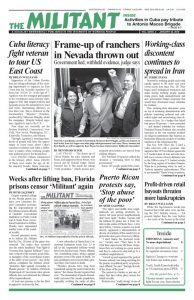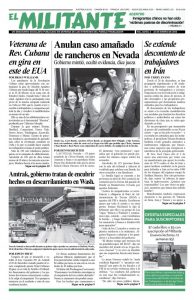January 22, 1993
CARDIFF, Wales — Amid jubilation by their supporters, three men framed up nearly five years ago, known as the Cardiff Three, were freed December 10 by the Court of Appeal in London. The three — Tony Paris, Yusef Abdullahi and Stephen Miller — had been sentenced to life for murder after the longest trial in British legal history.
The release of the Cardiff Three follows several other miscarriages of justice that have been overturned. In 1989 the Guildford Four, wrongfully convicted for a pub bombing in 1974, were freed after spending 14 years in prison. In 1991 the Birmingham Six, framed up for the murders of 21 people, were released.
January 22, 1968
WASHINGTON, D.C., Jan. 15 — Five thousand women marched and rallied here today, demanding that Congress resolve to end the war in Vietnam and “immediately arrange for the withdrawal of all American troops.”
Women came from 40 states, including Alabama, Alaska, Georgia, Kentucky, Montana, Oregon and Washington. Many of the women had not been on antiwar demonstrations before.
In the afternoon, the women met in a “Congress of American Women” which consisted of a full program of reports and speakers. A number of younger women from New York and Chicago elected coordinators to organize women’s groups in their own regions.
January 23, 1943
After three weeks of the strike in the anthracite coal mines, President Roosevelt yesterday ordered the miners to return to work. His order contained a thinly veiled threat to use troops if the miners persisted in their strike to win a $2 a day wage increase.
Three days before Roosevelt’s order the War Labor Board had ordered miners to return to work without guaranteeing them their wage demands. But the majority of the miners refused to comply.
The strike has been used by the anti-labor press and union busting-politicians and employers to whip up a reactionary crusade against labor. The miners’ strike is the most significant strike since the entrance of the U.S. into the war.

